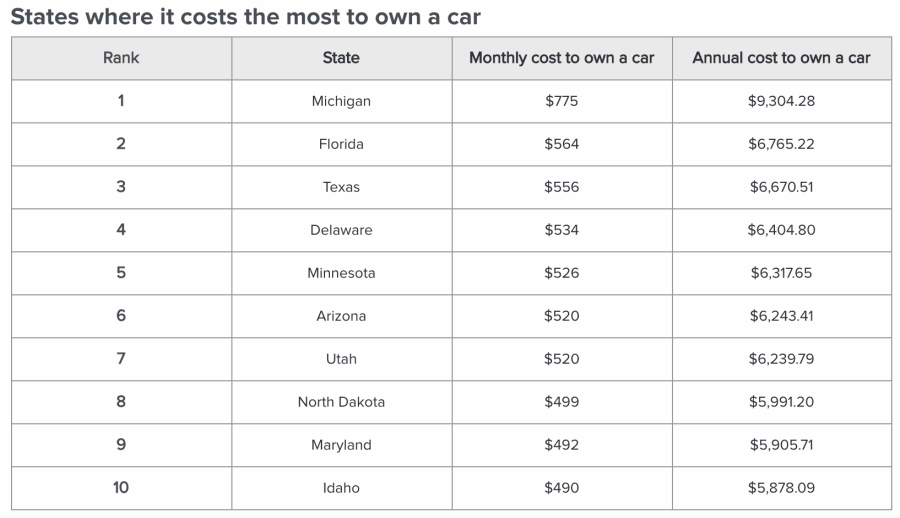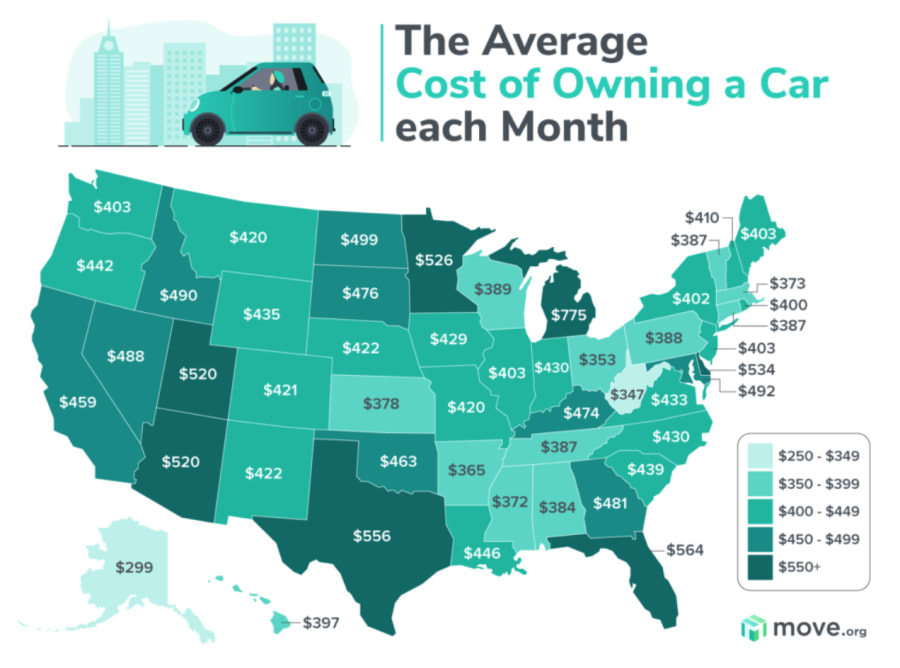Owning a car in Michigan is, well, exhausting.
Here’s what the data shows, and what’s being done to help mitigate this hardship.
Recommended Videos
- This report first appeared in our Data Drop newsletter -- subscribe here.
Costly cars
The Great Lakes State -- the undisputed birthplace of automobile manufacturing -- is the most expensive state for car ownership, according to data from Move.org.
- It costs about $5,264.58 every year to own a car in the United States
- The average Michigan resident pays $9,304.28 every year for their car.
- That’s a monthly cost of about $775 for Michiganders to own a car, way more than the national average.
This seems terribly unfair.
Look at this stunning gap between Michigan and the next most expensive state to own a car, Florida:

That’s a gap of more than $2,000 annually.
What gives?
Gas prices? Nope: The average cost for a gallon of gas in California -- the highest price in the country -- was $3.39 when this data was collected. The national average was $2.40, which was slightly more than where Michigan’s average cost per gallon was at the time, too. As of this newsletter, Michigan’s average gallon of gas costs about $2.80, placing it near the middle of the pack. California’s is now way up near $3.80 a gallon. Yikes.
No, it’s not the gas prices. The cost of insurance is the driving force behind this: On average, Americans pay $882 annually for the minimum state-required car insurance. Compared to this, Michigan’s minimum insurance cost of $5,740 seems incredibly expensive, according to the data. Another source, Valuepenguin.com, lists the average cost of full-coverage auto insurance in Michigan at $4,356 per year.
As you probably know by now, car insurance is so expensive in Michigan because the state requires the most expensive minimum coverage levels in the country. There’s also a high amount of auto insurance fraud claims in Michigan, leading to higher premiums.
WalletHub summed it up like this:
“Car insurance companies are required to pay up to $555,000 to cover lifetime medical expenses. Costs over this amount are covered by the non-profit Michigan Catastrophic Claim Association (MCCA). Michigan drivers contribute to the MCCA by paying an annual assessment fee through their insurance. That fee is $220 per vehicle in 2019. This is in addition to the high cost of PIP coverage, which continues to rise with increasing medical costs.
A high rate of insurance fraud, fueled by Michigan’s generous benefits, has led to even higher premiums. Studies show that 8% - 10% of all claims in Michigan are fraudulent. In addition, the high cost of insurance in Michigan has made coverage unaffordable for many drivers. Roughly 1 in 5 drivers in the state is uninsured, according to the Insurance Information Institute. Fewer insured drivers to pay premiums drives up the expense for those who are paying.
Expensive benefits and high rates of fraud and uninsured motorists have made Michigan one of the costliest states for car insurance.”
That’s not so nice to read ...
But there is some good news:
Over the summer, a law first passed in 2019 went into effect, allowing Michigan car owners to cut their auto insurance costs.
Here’s what it did:
Drivers now have a choice when it comes to coverage level. The previous law required you to have auto insurance that includes unlimited Personal Injury Protection (PIP) medical coverage to pay for your expenses if you are injured in an auto accident. The new auto insurance law allows you to choose a level of medical coverage when your policy is issued or renewed after July 1, 2020.
Note: If you were already receiving payments from your auto insurance policy due to injuries from an auto accident, you will continue to receive the current unlimited benefit regardless of the choice you make for the future.
Again, the new auto insurance law allows you to choose a level of PIP medical coverage. Insurance companies are required to reduce the premium for this coverage so that there will be an average reduction per vehicle based on the level of coverage chosen.
In August 2020, the state Department of Insurance and Financial Services said it approved six initial rate filings covering a quarter of the market. People who stick with unlimited benefits and buy policies from those companies should see an average 16.5% reduction on PIP instead of the 10% savings that is required.
Those with $500,000 in coverage should save 36.3% rather than 20%. At the $250,000 level, the cut will be 41.9%, above the 35% spelled out in law. Motorists enrolled in Medicaid, and who therefore can buy $50,000 in coverage, should see 54.3% savings rather than 45%.

Why, then, is it still so high in Michigan?
OK, well, that’s all nice and moving in a better direction, but we still need to see Michigan fall from the top of this “most expensive states to own a car list.” It’s one thing to be at the top of the list, but it’s even worse when second and third place are so much cheaper.
The July 1, 2020 law change was supposed to save Michigan drivers at least $120 per car as drivers choosing less than unlimited PIP medical will not pay any assessment to the MCCA. However, the savings were expected to be offset some because the new law raised the level of required bodily injury liability insurance -- which generally represents about 10% of a premium. It covers claims made against an at-fault driver for serious injuries to others.
And so it seems we’re not seeing as much of a decrease as we’d hoped. Perhaps not enough car owners took action when the law went into effect in July. There could be many variables at play here.
Either way, here we are in March 2021, and we’re still seeing Michiganders paying the most to own and insure a car.
Resource: Best cheap car insurance in Michigan (2021)



